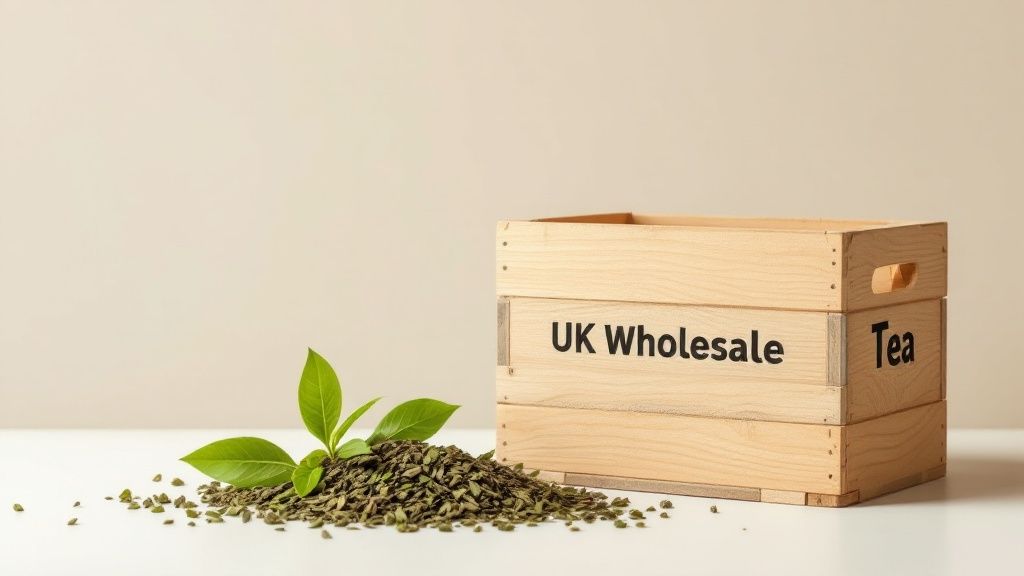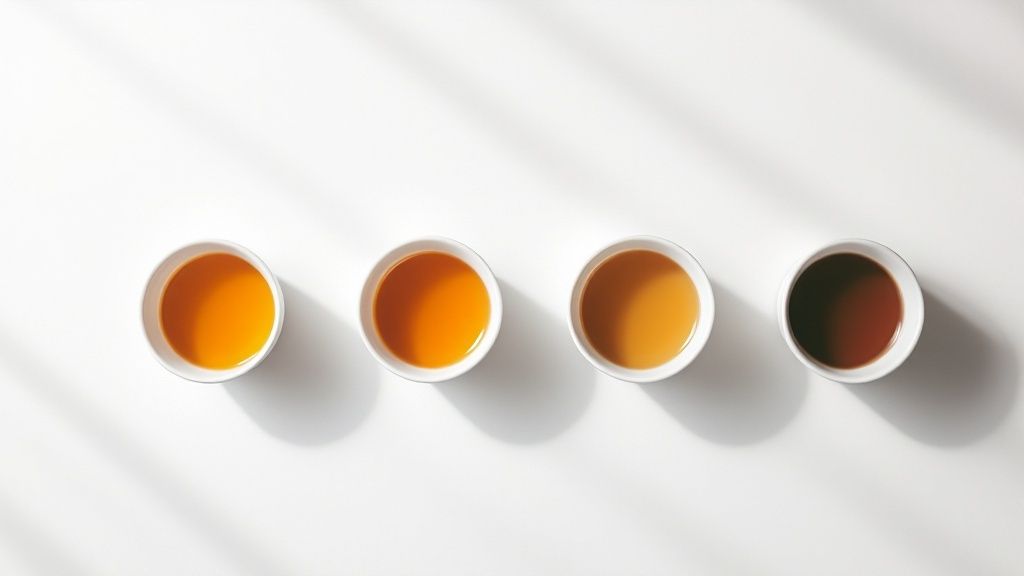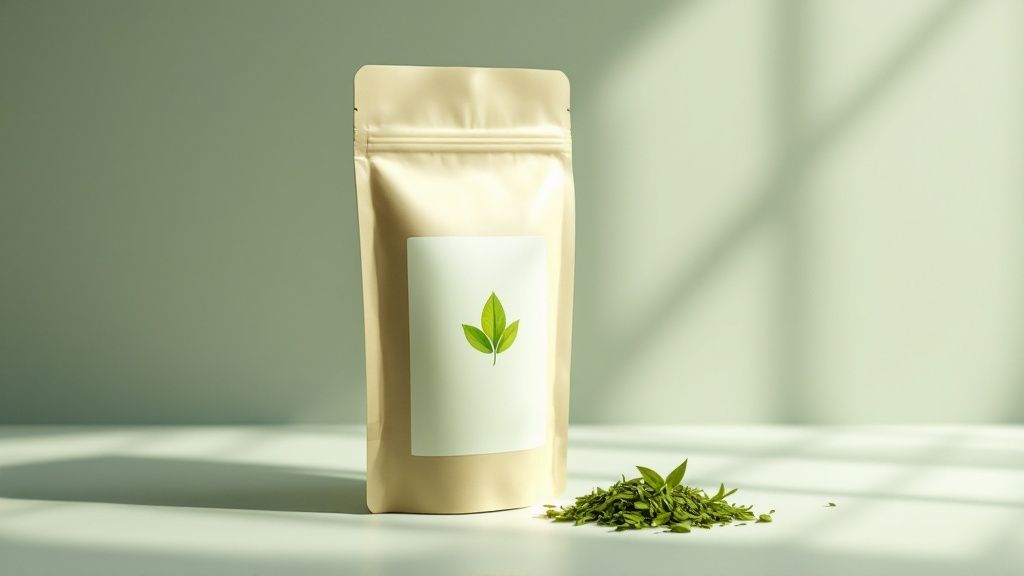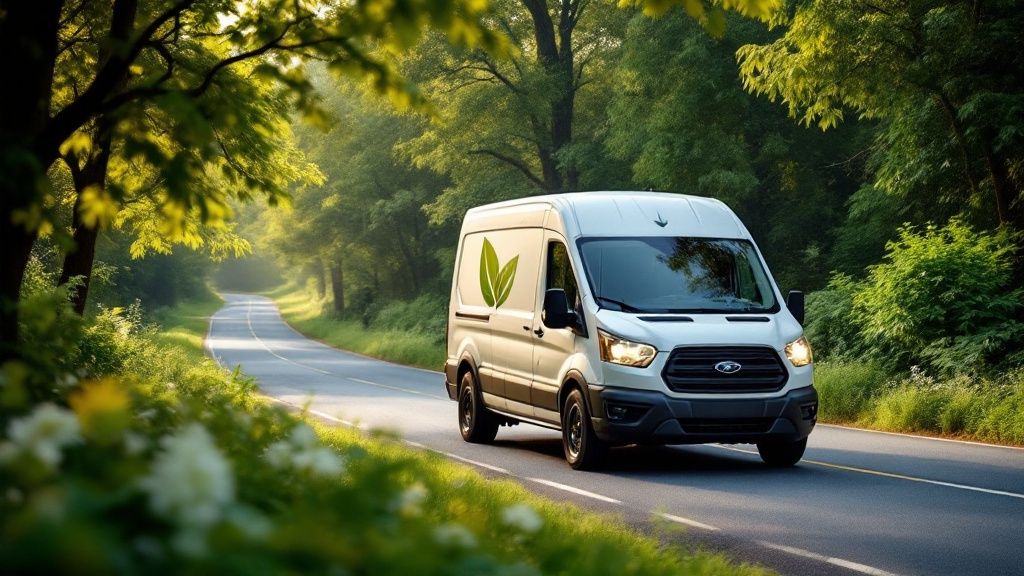Your search for the right wholesale tea suppliers in the UK is about so much more than just a business transaction. It’s a decision that sits at the very heart of your customer’s experience, and frankly, it can make or break your business. Finding a partner who gets it—who delivers on quality, consistency, and value—is the secret to creating a tea menu that people love and that builds a strong brand in a crowded market.
Why Choosing the Right Tea Supplier Matters

Picking a wholesale tea supplier isn’t just ticking a box on a to-do list; it’s about forming a partnership that defines your brand's reputation. Your supplier is effectively the guardian of the quality you promise every customer. A poor supplier can mean inconsistent flavours, stock that never shows up on time, and a damaged reputation. A great one, on the other hand, becomes a silent, indispensable partner in your success.
Think of this guide as your map. We'll walk you through everything, from what a truly great supplier actually does to building a practical checklist for evaluating them, untangling logistics, and making sure your values around ethical sourcing align.
Building a Foundation for Quality
The quality of your tea is the one thing you can’t compromise on. It is the customer experience, and it all starts with your supplier. When you work with a supplier who is genuinely passionate about excellence, you’re not just buying tea; you’re gaining access to a world of carefully sourced leaves and expertly crafted blends. That commitment to quality is what makes every cup you serve a memorable one. You can dive deeper into why choosing good quality tea makes a real, tangible difference.
Your choice of supplier is a direct reflection of your brand's values. A commitment to high-quality, ethically sourced tea tells your customers you care about excellence before they even take their first sip.
Navigating the UK Tea Market
The UK tea market is a fascinating mix of old traditions and new energy. The wider sector for Coffee, Tea & Spices Wholesaling, where tea suppliers live, was on track to bring in around £2.8 billion in revenue in 2025. While there's been a bit of a dip recently, forecasts show growth is just around the corner, proving just how resilient and vital this industry is. You can get more details on the trends in the UK's tea wholesaling industry on ibisworld.com.
All this market movement makes your choice of supplier even more important. A partner with their finger on the pulse can help you navigate the trends, offering insights into popular blends and what customers are looking for, which helps keep your menu fresh and exciting.
What a Great Wholesale Tea Supplier Actually Does

A truly brilliant wholesale tea supplier does so much more than just shift boxes from one place to another. They aren't just a vendor; think of them as a vital partner for your business, a curator of incredible flavours, and your direct line to the world's finest tea gardens.
They’re the experts who handle the incredibly complex journey of the tea leaf. It's a long road from being hand-plucked on a remote mountainside to steeping perfectly in your customer's cup. This journey is a maze of logistics, quality checks, and international relations that would be a nightmare for any single café or hotel to manage on its own.
The Art and Science of Curation
The very best wholesale tea suppliers in the UK don’t simply buy what’s easy or cheap. They meticulously source and select every tea in their collection. This often means building deep, long-term relationships with specific tea estates and farmers, sometimes even travelling to the gardens to truly understand the terroir—that magical mix of soil, climate, and geography that gives a tea its unique personality.
This hands-on approach to sourcing brings some serious benefits:
- Unwavering Quality: Working directly with growers means they can guarantee only the best leaves are picked and processed to their incredibly high standards.
- Complete Traceability: They can pinpoint the exact origin of every tea, right down to the estate and the harvest season. That kind of transparency is gold when it comes to building trust with your customers.
- Ethical Practices: These strong relationships allow them to confirm that farmers are treated fairly and that sustainable methods are used, helping you serve a cup of tea that aligns with your values.
This careful curation is what really separates the good from the great. They act as your quality gatekeeper, making sure every single batch you order is consistent in flavour, aroma, and appearance.
Masters of Blending and Innovation
Beyond finding stunning single-origin teas, a great supplier is also an artist in the blending room. They have the expertise to create unique and unforgettable flavour profiles that can become the signature brew for your business. A classic Earl Grey, for instance, isn't just a random mix of black tea and bergamot. It's a delicate balancing act, using specific tea bases and high-quality, natural oils to create a truly harmonious taste.
A supplier’s ability to innovate and create bespoke blends is a powerful asset. It allows you to offer something truly unique in the market—a flavour that customers can only find at your establishment.
They also keep their finger on the pulse of the industry. A genuinely engaged partner stays on top of market trends, introducing you to exciting new finds, from rare oolongs to wellness-focused herbal infusions. They give you the insights to keep your menu fresh and interesting. For example, they might spot a growing interest in functional botanicals and suggest developing a new blend with turmeric and ginger.
This proactive relationship means you're not just chasing trends; you're helping to create them. A top-tier wholesale tea supplier in the UK does far more than just sell you a product. They provide expertise, ensure consistency, and offer a partnership that helps your business grow and build a fantastic reputation.
How to Evaluate Potential Tea Suppliers

Choosing the right wholesale tea supplier in the UK can feel overwhelming. With so many options, it's easy to get lost. But with a methodical approach, you can cut through the noise and find a partner who will genuinely help your business thrive.
This isn’t just about finding the cheapest tea; it’s about finding the right partner. A great supplier is an extension of your own brand, someone who understands your commitment to quality and your operational realities. We'll walk through the key things to look for, from the tea itself to the logistics of getting it to your door.
The Core Pillars of a Great Supplier
Before you get into the finer details, there are a few non-negotiables that should be at the top of your list. These are the foundations of any strong supplier relationship.
-
Tea Quality and Consistency: This is everything. The first step should always be to request samples and do a blind tasting. Does the tea taste as good as it sounds? Is the aroma what you expected? Crucially, you need to know if they can deliver that same quality, order after order. Consistency is king.
-
Sourcing and Transparency: Any supplier worth their salt will be proud of where their tea comes from. Don’t be afraid to ask about the specific estates, regions, or even harvest dates. A partner who is open about their supply chain is a partner you can trust.
-
Product Range: Take a good look at their catalogue. Does it offer the variety you need? A good supplier will have everything from classic black teas and delicate green teas to exciting herbal infusions and speciality options. This gives you the freedom to evolve your menu without having to find a new supplier down the line.
At the end of the day, it all comes down to the taste. A slick website and a persuasive sales pitch mean nothing if the tea itself is disappointing. Always, always trust your palate.
Customisation and Support
Once you’ve nailed the basics, it’s time to look at what else a supplier can bring to the table. This is where a good supplier transforms into a true partner who is invested in your success.
The ability to create a custom blend is a game-changer for many businesses. Having a signature "house blend" that customers can't get anywhere else is a fantastic way to build your brand. Many top-tier wholesale tea suppliers in the UK offer this service, working with you to craft a unique flavour profile.
Beyond the product, what kind of support do they offer? Do they provide training for your staff on brewing techniques or help with menu creation? A supplier who offers these resources clearly wants you to succeed. For a wider view on the wholesale business model, this guide on sourcing and selling wholesale offers some great general principles.
Getting the Logistics Right
Finally, you have to look at the practical side of things. The most incredible tea in the world won’t help you if the supplier’s operations don't sync up with yours.
Here are a few logistical points to tick off:
-
Minimum Order Quantities (MOQs): Do their MOQs work for your business? A small, independent café needs a supplier with flexible, low MOQs to keep stock fresh and manage cash flow. A large hotel, on the other hand, might need bigger volumes to secure better pricing.
-
Pricing and Overall Value: Look beyond the simple price-per-kilo. What’s the total value you’re getting? This includes the quality of the tea, the support offered, and the reliability of their service. Make sure their pricing is transparent, with no hidden costs for things like delivery.
-
Lead Times and Reliability: How quickly can you get an order? And more importantly, can they deliver on time, every time? Unreliable deliveries can lead to empty shelves and disappointed customers, so this is a critical point to confirm.
To help you keep track, we’ve put together a simple checklist you can use when comparing potential partners.
Supplier Evaluation Checklist
This checklist is a straightforward tool to score and compare suppliers against the criteria that matter most to your business.
| Evaluation Criteria | What to Look For | Importance (High/Medium/Low) |
|---|---|---|
| Tea Quality | Flavour, aroma, and appearance of samples. | High |
| Consistency | Guarantees of batch-to-batch quality. | High |
| Sourcing Transparency | Clear information on tea origins (estate, region). | Medium |
| Product Range | Diversity of teas offered (classics, speciality, herbal). | High |
| Custom Blending | Availability of bespoke blend creation services. | Medium |
| Training & Support | Staff training, menu advice, marketing materials. | Medium |
| MOQs | Flexibility and suitability for your business volume. | High |
| Pricing Structure | Clear, transparent pricing with no hidden fees. | High |
| Lead Times | Time from order placement to delivery. | High |
| Delivery Reliability | On-time delivery track record. | High |
| Customer Service | Responsiveness and helpfulness of their team. | Medium |
By working through these key areas—from the quality in the cup to the efficiency of the delivery—you can move forward confidently.
If you’re ready to partner with a supplier that ticks all these boxes, you can find out more about how we work by opening a trade account with us.
Understanding Tea Logistics and The Supply Chain

So, you’ve picked a partner from the many wholesale tea suppliers in the UK. Now the real work begins. This is where the promises made during those initial chats are put to the test in the day-to-day reality of orders, deliveries, and keeping your shelves stocked.
A truly great supplier does more than just sell you tea; they take the headache of the global supply chain completely off your plate. They handle the complex journey from the moment the leaves are picked—sorting out customs, international freight, and quality checks—right up until the boxes land on your doorstep. This frees you up to focus on what you’re brilliant at: delighting your customers.
Getting to grips with the basics of this process is crucial. It’s what keeps your operations running smoothly, your tea tasting fresh, and prevents that dreaded moment of telling a customer their favourite blend is out of stock.
Tracing the Tea Journey From Order to Delivery
The moment you place an order, a whole series of cogs start turning. It's a complex machine, and one of the first things to understand is lead time—the gap between ordering and receiving your tea.
Your everyday English Breakfast blend is probably sitting in your supplier's UK warehouse, meaning it could be with you in just a couple of days. But what about that rare, single-estate Darjeeling from a specific spring harvest? That might need to be ordered directly from the garden in India, which naturally takes a lot longer.
This is why open communication with your supplier is non-negotiable. Always ask about the expected delivery timeline for every tea on your menu so you can plan your stock levels properly. A dependable partner will give you clear estimates and a heads-up if there are any delays, so you’re never left scrambling.
Navigating Delivery and Stock Control
Once your order is picked and packed, it needs to get to you. Most wholesale tea suppliers in the UK have a few delivery options, whether it’s a standard courier for a small top-up or a full pallet for a large order. It’s important to factor these costs into your pricing, as they can eat into your margins if you're not careful.
Then comes stock control, which is honestly the bedrock of any successful tea programme. It's a constant balancing act. You need enough tea to meet demand without overstocking, which ties up your cash and, worse, risks your tea going stale.
The goal of smart inventory management is simple but crucial: ensure the last cup of tea from a batch tastes just as fresh and vibrant as the first. This consistency is what builds customer loyalty and reinforces your reputation for quality.
The best way to do this is with a First-In, First-Out (FIFO) system. It just means you always use your oldest stock first, so every cup is served at its peak. Doing a quick stocktake regularly helps you spot what’s selling fast, what’s not, and makes reordering a much more informed decision.
If you’re tight on space, managing bulky tea sacks can be a real challenge. Sometimes, a practical approach is needed, like finding business storage solutions in the UK to keep your surplus stock safe and sound, leaving your main workspace free and efficient.
The Critical Role of Packaging
Packaging isn’t just a pretty box. It’s a vital shield that preserves the quality and flavour of your tea. How your supplier packs their tea has a direct impact on its shelf life and how you need to store it.
Here are the most common formats you’ll come across:
- Vacuum-Sealed Bulk Bags: These are the gold standard for long-term freshness. By sucking all the oxygen out, they stop the delicate leaves from degrading. Perfect for the stock you won’t be using right away.
- Resealable Foil Pouches: You'll see these everywhere, and for good reason. They’re great for front-of-house, offering solid protection from light and air while being easy to open and close during a busy service.
- Retail-Ready Tins or Boxes: If you want to sell tea for your customers to enjoy at home, you’ll need attractive retail packaging. It has to look good on the shelf and be functional enough to protect the tea once it leaves your shop.
Understanding these moving parts—from lead times to packaging—gives you the confidence to run your tea offering like a pro. It turns your relationship with a supplier from a simple transaction into a smooth, efficient partnership built for the long haul.
The Importance of Ethical and Sustainable Sourcing
The conversation around tea has changed, and it's changed for the better. Your customers are more curious and conscious than ever. They don't just want a delicious cup of tea; they want to know the story behind it, where it came from, and who grew it.
Partnering with a supplier committed to ethical and sustainable practices isn't just a nice bonus anymore. It's a powerful statement about your brand's values. It tells your customers you care about fairness, the environment, and the future of the tea industry itself. This commitment can become a core part of your brand, forging a much deeper connection with your community.
Decoding Key Certifications
When you start digging into wholesale tea suppliers in the UK, you’ll see a few common certifications pop up. These aren't just logos on a packet; they're a quick way to understand a supplier's standards and their promise of responsible practices. Knowing what they mean helps you make a truly informed choice.
Here are the big ones you'll likely encounter:
- Fairtrade: This is all about social and economic fairness. It’s a guarantee that farmers receive a fair price for their tea, which allows them to invest back into their communities and build a better future. It also ensures decent working conditions for everyone involved.
- Rainforest Alliance: You'll know this one by its green frog seal. Its focus is on environmental conservation—promoting biodiversity, managing land sustainably, and protecting natural resources. The standard also includes provisions for the well-being of workers and their local communities.
- Organic: An Organic seal guarantees the tea was grown without synthetic pesticides, herbicides, or fertilisers. This is obviously better for the soil and the local ecosystem, but it also meets the growing demand from customers for clean, natural products.
By partnering with a supplier who holds these certifications, you are not just buying tea; you are actively supporting a more equitable and sustainable global supply chain. This alignment of values can attract and retain customers who share your commitment.
Verifying a Supplier's Commitment
Certifications are a fantastic starting point, but a truly ethical supplier’s commitment goes much deeper. How can you be sure their claims are genuine? It all comes down to transparency.
A supplier who is genuinely passionate about ethical sourcing will be proud to talk about it. Don't be shy about asking direct questions—ask about their relationships with specific tea gardens and how they're tackling industry challenges like climate change. A supplier who's truly invested will have detailed answers ready. You can get a feel for this by exploring our own ethical policy and sourcing commitments, which details our dedication to these very principles.
Aligning with Modern Consumer Values
The UK tea market is seeing a fascinating shift. People are moving beyond the standard black teabag and exploring herbal and flavoured alternatives, often driven by a focus on health and wellness.
This trend is tied directly to a rising public concern for environmental and social impact. Customers want to feel good about what they're buying. By choosing a wholesale tea supplier in the UK that champions sustainability, you position your business to meet this growing demand head-on. It's a smart decision that not only feels right but also makes perfect business sense, helping you connect with the modern, conscious consumer.
Common Questions About UK Wholesale Tea Suppliers
Dipping your toes into the world of wholesale tea can feel a bit daunting. You've probably got a dozen practical questions buzzing around your head, and getting solid answers is key to feeling confident about your choices. Let's tackle some of the most common queries we hear from businesses looking to partner with wholesale tea suppliers in the UK.
Think of this as a handy FAQ section, designed to clear up any lingering doubts and give you the practical details you need to get started.
What Is a Typical Minimum Order Quantity?
This is a big one, and the honest answer is: it varies wildly. There’s no hard-and-fast rule across the industry, as the Minimum Order Quantity (or MOQ) really depends on the supplier’s size and how they operate.
For instance, a smaller, specialist supplier might have MOQs as low as 1kg per tea. This is brilliant for a small café that wants to experiment with new flavours without committing to a mountain of stock. On the other hand, larger distributors catering to bigger clients often need a more significant commitment, sometimes asking for 5-10kg per tea or a minimum total order value. The trick is to find a supplier whose model fits your business's rhythm, sales volume, and storage space.
Can I Request Custom Tea Blends?
You absolutely can, and you should consider it! Many of the best UK suppliers offer a bespoke blending service, and it's one of the most exciting ways to create a signature "house blend" that makes your brand truly unique.
It usually kicks off with a good chat where you discuss the exact flavour profile you’re after. The supplier then gets to work, creating samples for you to taste and tweak until it's just right.
A custom blend isn't just a unique product; it's a brilliant marketing tool. It gives your customers a reason to come back to you, because they can't get that specific taste anywhere else.
Just keep in mind that this special service often comes with higher MOQs and sometimes a one-off development fee to cover the blender's time and expertise.
How Can I Verify a Supplier's Tea Quality?
Trust, but always verify. A top-notch wholesale tea supplier in the UK will be completely open and transparent, but it's your job to check. The most important step? Always ask for samples before you commit to a big order. Ultimately, your own taste buds are the final say.
Beyond simply tasting, look for recognised certifications like Organic or Fairtrade, as these provide independent proof of their standards. A great supplier will be proud of where their tea comes from, so don't be shy about asking for the details – the specific estate, the region it was grown in, even the harvest date. They'll see your questions not as a hassle, but as a sign that you’re a serious and knowledgeable partner.
Ready to partner with a supplier that delivers on quality, transparency, and genuine support? At Jeeves & Jericho, we offer award-winning teas and build partnerships on trust. Explore our wholesale offerings and start your journey today at https://www.jeevesandjericho.com.


